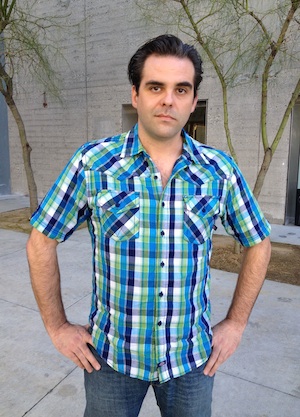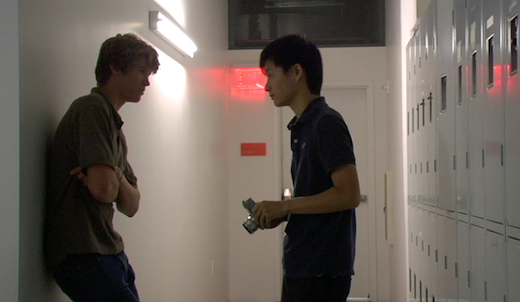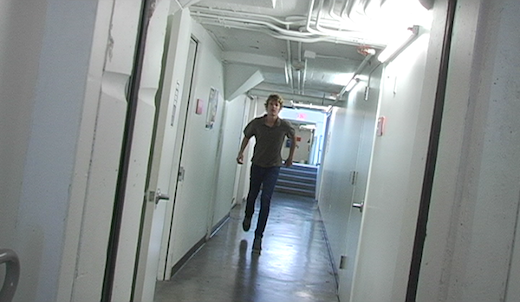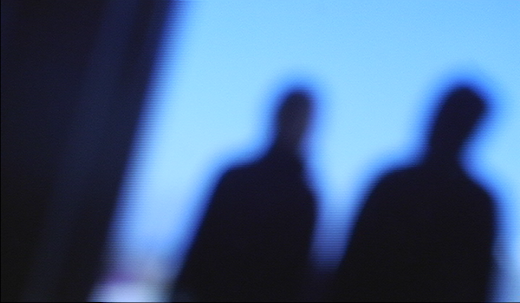
Writer/director/producer, Art Center alumnus and Saturday High instructor Chris Gehl. Photo: Mike Winder
In a recent interview, The Godfather director Francis Ford Coppola said, “The cinema language happened by experimentation—by people not knowing what to do.”
For Chris Gehl, an Art Center alumnus and a film instructor in Saturday High—Art Center College of Design’s program for high school students (grades 9–12)—venturing into unknown territory is par for the course. The Los Angeles-based writer/director/producer spends most of his Saturdays at South Campus, teaching Directing for Film and Writing for Film during the Spring and Fall terms and the Writing for Film and the Film Production workshops during the Summer.
With the beginning of the Spring Term less than two weeks away, we caught up with Gehl to ask him more about his Saturday High classes.
How much filmmaking experience do your incoming students have?
The nice thing about Saturday High is that it attracts a great cross section of the universe. Because we’re in Southern California, sometimes you get students who have parents or relatives in the industry. Then there are some students have more sophisticated tastes because they’ve been exposed to more film history. And some students come to class with no experience whatsoever. In fact, for some kids, this might be the only art education that they’re getting. So it’s a really nice mix.
What kind of projects do your students work on in your Directing class?
I’ll give you one example. During the first week of class, when we’re getting to know each other, I give them an assignment where they shoot a three- or four-panel comic strip. I break the class up into teams, each person brings in a comic strip from home, and I give them 30 minutes to shoot it. And we break up the duties: one person directs, two people act, someone operates the camera and someone operates the boom. And then we switch it up. So everybody gets to direct and everybody gets an idea of how a production team works. We end up shooting three or four of them over the course of the day.
How do your Summer Workshops differ from the five-week classes?
The obvious difference is that they’re more intensive. In the Writing for Film workshop, we meet six hours every day, so I typically screen a film in the morning and then we really break the film down by talking about its main story points, the conflict, the protagonist and the antagonist. For the second half of the day, we go into the computer lab and I teach the students how to use Final Draft, give them copies of scripts, watch scenes from movies and review scripts.
Do you show students films that they’re already familiar with?
Sometimes. Last term in Writing for Film I focused on films that had been nominated for the best original screenplay Oscar from 1940 to the present. In the Film Production class this summer I screened documentaries that explored the process of filmmaking. On the first day of class I showed them Hearts of Darkness: A Filmmaker’s Apocalypse. And I screened that for them because it’s the ultimate example of the fact that filmmaking can be hard. That movie documents what was probably the toughest shoot in history, but it resulted in Apocalypse Now. Funny enough, none of my students had actually heard of Apocalypse Now, but by the end of the week they had all watched it.
What other films do you analyze in class?
I try to show them examples of influential directors like Akira Kurosawa and Orson Welles who changed the way we make movies and watch films. Probably the film that I’ve screened the most is The Third Man, which the students love. It’s a timeless movie. It could come out today and hold up just as well as it did then. There’s a real honesty to the dialogue and it’s one of those movies you really have to pay attention to. As the film moves along, you keep asking, “Who’s the third man?” The main character of the film doesn’t even show up until the third act. I like to show that film as an example that there are rules to crafting a story, but once you know what those rules are, you can break them.
What kind of films have your students come to class excited to discuss?
District 9 was especially popular with my students, and they seem to keep coming back to it. We tossed a lot of ideas back and forth about that film. The first time I taught in Saturday High was the Fall after that film first came out, and three of the films we shot in that course were done in a District 9 pseudo-documentary style. And if you don’t have a budget, that style is a really good way to tell your story. In class I show the students Casual Laborer, my first film I made when I was 19 as a student at Seattle Central Community College, which was a fake documentary about the world’s worst grocery store employee. I show it to them as an example that their first film isn’t necessarily going to be a masterpiece. But if you stick with it, you’ll get there.
What’s the Saturday High advantage for a teen interested in making films?
The most important advantage is that we have a great faculty. Everybody who comes down to South Campus to teach on Saturdays really wants to do it and they’re professionals in their fields. There’s an insight that you get here that you won’t get elsewhere. A lot of my students have had cinema classes in high school, but they generally don’t get the depth of exposure that they do here. When it comes to teaching, I don’t dumb the material down for my students and I don’t patronize them. I have conversations with them, I can relate to them and I find that they’re very open to ideas. Many students have come up to me at the end of the first day and said, “I learned more in three hours in this class than I learned in a year of my cinema class in high school.” As a teacher, that makes me feel really good.
Filmmaking is just one of several career options to explore in Saturday High. Classes start February 4, so register today.











